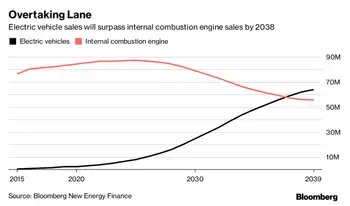Vermont grid planners face a tough task
Long-term contracts with the Vermont Yankee nuclear plant and Hydro-Quebec, which supply roughly two-thirds of the state's electricity, will expire soon.
Economic woes have – at least temporarily – reduced demand for electricity.
Smart-grid technology and electric vehicles may change how and how much power is used as well.
That's the uncertain environment facing VELCO, the company that runs the state's electrical transmission grid, as it writes its plan for the next two decades.
"We have an obligation to operate that system responsibly and to keep the lights on," said John Donleavy, the president and CEO of VELCO (the Vermont Electric Power Company, Inc.) But the company, owned by the distribution utilities that deliver power from transmission lines to houses and businesses, also has an obligation to consider things besides new power lines and substations, he said.
"We factor in Vermont beliefs and values into the technical solutions and make sure we get the solution that works for everyone," he said in Montpelier, at the final of a half-dozen public hearings on the draft version of VELCO's plan.
The new transmission plan came in part out of questions raised about the company's planning process and outreach around the Northwest Reliability Project, a power line from the Rutland area to Chittenden County that ran both into cost overruns and public opposition.
The plan that is now being commented on publicly – it will be presented to the Vermont Public Service Board, which regulates utilities, in mid-summer – is in part an effort to begin looking for transmission alternatives. Among those options are locally generated power, demand-side management and efficiency that can reduce the need for new power lines.
That doesn't mean VELCO isn't facing questions about whether its current projects, like the Southern Loop, which includes a high-power line from Vernon to Cavendish as well as other work, are the best and cheapest alternatives.
At its public hearing at Vermont College of Fine Arts campus in Montpelier, Barry Bernstein, president of the Washington Electric Co-operative, a member-owned utility, wondered if the VELCO plan does enough to take into account lowered electrical demand and other factors as it projects future power needs.
"We have seen a lot of changes in the last 18 months," Bernstein said. "It is VELCO and all the other utilities responsibility to talk about not just meeting the load growth, but restraining that load growth."
This year load growth – the increase in demand for electricity – has been less than in previous years. But that may not be true in the long-term, Donleavy said. The economic problems of the last year or so will presumably end at some point, and electric vehicles and other factors may mean more demand for power in the long run, he said.
Also, for companies to move to Vermont and expand in the state there must be a reliable electrical system, especially given the importance of the Internet to those companies, Donleavy said.
Although the load growth assumptions in the company's draft plan were largely made before the economic turbulence, the projected need for power line projects are based not on a particular date but on demand triggers, said Dean LaForest, a planner for VELCO.
So although the plan outlines 25 projects that may be necessary, most or all of them will be delayed if the electricity demands are less than now expected, he said.
Of those 25 projects, 19 are on currently existing substations, four more are power line projects in existing right-of-ways that now have electrical lines, and two are new transmission lines.
VELCO, based in Rutland, has also built projects that came in far above their original cost estimates. That is something the company has worked on improving in recent years and in fact has been working on with other New England power companies and regulators, Donleavy said.
"We obviously cannot be estimating projects at one cost and delivering them at another," he said. Newer projects are on track to come in close to or at budget, he said.
Related News

Parked Electric Cars Earn $1,530 From Europe's Power Grids
PARIS - Electric car owners are earning as much as $1,530 a year just by parking their vehicle and feeding excess power back into the grid.
Trials in Denmark carried out by Nissan and Italy’s biggest utility Enel Spa showed how batteries inside electric cars could help balance supply and demand at times and provide a new revenue stream for those who own the vehicles.
Technology linking vehicles to the grid marks another challenge for utilities already struggling to integrate wind and solar power into their distribution system. As the use of plug-in cars spreads, grid managers will have to pay…




